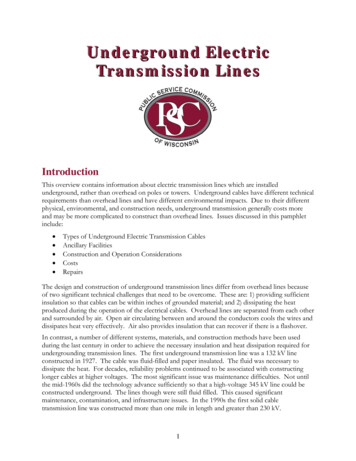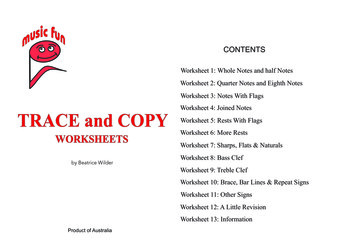
Transcription
Notes from the UndergroundAuthor(s):Dostoevsky, Fyodor (1821-1881)Publisher:Christian Classics Ethereal Library, Grand Rapids, MIDescription:Many consider Dostoevsky’s Notes from the Undergroundthe first existentialist novel. The narrator and main character,often called “the Underground Man,” is a bitter, misanthropicretiree living in St. Petersburg. He lives each day in constantphysical and psychological pain. He has no job and livesentirely off of his retirement funds. A bad tooth and an achingliver make it difficult for him to do anything but stay at homeand write “notes” about his ennui and suffering. The Underground Man shares moments from his past, and throughthem, he explains how he came to despise both himself andother people. Masterfully, Dostoevsky immerses the readerin the dark, but fascinating, mind of his narrator. Notes fromthe Underground remains one of the great Russian novelist’smost popular works and is one of the most widely-read andinfluential works of classic literature of the last century.Kathleen O’BannonCCEL Staffi
ContentsNotes from the Underground1Author's Note2PART I - 0IX.24X.26XI.28PART I - A Propos of the Wet .79X.84ii
This PDF file is from the Christian Classics Ethereal Library, www.ccel.org. The mission ofthe CCEL is to make classic Christian books available to the world. This book is available in PDF, s.html.andotherformats.See Discuss this book online at http://www.ccel.org/node/5620.The CCEL makes CDs of classic Christian literature available around the world through theWeb and through CDs. We have distributed thousands of such CDs free in developingcountries. If you are in a developing country and would like to receive a free CD, pleasesend a request by email to cd-request@ccel.org.The Christian Classics Ethereal Library is a self supporting non-profit organization atCalvin College. If you wish to give of your time or money to support the CCEL, please visithttp://www.ccel.org/give.This PDF file is copyrighted by the Christian Classics Ethereal Library. It may be freelycopied for non-commercial purposes as long as it is not modified. All other rights are reserved. Written permission is required for commercial use.iii
Notes from the UndergroundNotes from the Underground1
Author's NoteAuthor's Note*The author of the diary and the diary itselfare, of course, imaginary. Nevertheless it is clearthat such persons as the writer of these notesnot only may, but positively must, exist in oursociety, when we consider the circumstances inthe midst of which our society is formed. I havetried to expose to the view of the public moredistinctly than is commonly done, one of thecharacters of the recent past. He is one of therepresentatives of a generation still living. In thisfragment, entitled "Underground," this personintroduces himself and his views, and, as it were,tries to explain the causes owing to which he hasmade his appearance and was bound to make hisappearance in our midst. In the second fragmentthere are added the actual notes of this personconcerning certain events in his life. --AUTHOR'S NOTE.2
PART I - UndergroundPART I - Underground3
I.I am a sick man. . I am a spiteful man. I am an unattractive man. I believe my liver isdiseased. However, I know nothing at all about my disease, and do not know for certainwhat ails me. I don't consult a doctor for it, and never have, though I have a respect formedicine and doctors. Besides, I am extremely superstitious, sufficiently so to respectmedicine, anyway (I am well-educated enough not to be superstitious, but I am superstitious).No, I refuse to consult a doctor from spite. That you probably will not understand. Well, Iunderstand it, though. Of course, I can't explain who it is precisely that I am mortifying inthis case by my spite: I am perfectly well aware that I cannot "pay out" the doctors by notconsulting them; I know better than anyone that by all this I am only injuring myself andno one else. But still, if I don't consult a doctor it is from spite. My liver is bad, well--let itget worse!I have been going on like that for a long time--twenty years. Now I am forty. I used tobe in the government service, but am no longer. I was a spiteful official. I was rude and tookpleasure in being so. I did not take bribes, you see, so I was bound to find a recompense inthat, at least. (A poor jest, but I will not scratch it out. I wrote it thinking it would soundvery witty; but now that I have seen myself that I only wanted to show off in a despicableway, I will not scratch it out on purpose!)When petitioners used to come for information to the table at which I sat, I used togrind my teeth at them, and felt intense enjoyment when I succeeded in making anybodyunhappy. I almost did succeed. For the most part they were all timid people--of course, theywere petitioners. But of the uppish ones there was one officer in particular I could not endure.He simply would not be humble, and clanked his sword in a disgusting way. I carried on afeud with him for eighteen months over that sword. At last I got the better of him. He leftoff clanking it. That happened in my youth, though.But do you know, gentlemen, what was the chief point about my spite? Why, the wholepoint, the real sting of it lay in the fact that continually, even in the moment of the acutestspleen, I was inwardly conscious with shame that I was not only not a spiteful but not evenan embittered man, that I was simply scaring sparrows at random and amusing myself byit. I might foam at the mouth, but bring me a doll to play with, give me a cup of tea withsugar in it, and maybe I should be appeased. I might even be genuinely touched, thoughprobably I should grind my teeth at myself afterwards and lie awake at night with shamefor months after. That was my way.I was lying when I said just now that I was a spiteful official. I was lying from spite. Iwas simply amusing myself with the petitioners and with the officer, and in reality I nevercould become spiteful. I was conscious every moment in myself of many, very many elementsabsolutely opposite to that. I felt them positively swarming in me, these opposite elements.I knew that they had been swarming in me all my life and craving some outlet from me, butI would not let them, would not let them, purposely would not let them come out. They4
I.tormented me till I was ashamed: they drove me to convulsions and--sickened me, at last,how they sickened me! Now, are not you fancying, gentlemen, that I am expressing remorsefor something now, that I am asking your forgiveness for something? I am sure you arefancying that . However, I assure you I do not care if you are. .It was not only that I could not become spiteful, I did not know how to become anything;neither spiteful nor kind, neither a rascal nor an honest man, neither a hero nor an insect.Now, I am living out my life in my corner, taunting myself with the spiteful and uselessconsolation that an intelligent man cannot become anything seriously, and it is only thefool who becomes anything. Yes, a man in the nineteenth century must and morally oughtto be pre-eminently a characterless creature; a man of character, an active man is pre-eminently a limited creature. That is my conviction of forty years. I am forty years old now, andyou know forty years is a whole lifetime; you know it is extreme old age. To live longer thanforty years is bad manners, is vulgar, immoral. Who does live beyond forty? Answer that,sincerely and honestly I will tell you who do: fools and worthless fellows. I tell all old menthat to their face, all these venerable old men, all these silver-haired and reverend seniors!I tell the whole world that to its face! I have a right to say so, for I shall go on living to sixtymyself. To seventy! To eighty! . Stay, let me take breath .You imagine no doubt, gentlemen, that I want to amuse you. You are mistaken in that,too. I am by no means such a mirthful person as you imagine, or as you may imagine;however, irritated by all this babble (and I feel that you are irritated) you think fit to ask mewho I am--then my answer is, I am a collegiate assessor. I was in the service that I mighthave something to eat (and solely for that reason), and when last year a distant relation leftme six thousand roubles in his will I immediately retired from the service and settled downin my corner. I used to live in this corner before, but now I have settled down in it. My roomis a wretched, horrid one in the outskirts of the town. My servant is an old country- woman,ill-natured from stupidity, and, moreover, there is always a nasty smell about her. I am toldthat the Petersburg climate is bad for me, and that with my small means it is very expensiveto live in Petersburg. I know all that better than all these sage and experienced counsellorsand monitors. . But I am remaining in Petersburg; I am not going away from Petersburg!I am not going away because . ech! Why, it is absolutely no matter whether I am goingaway or not going away.But what can a decent man speak of with most pleasure?Answer: Of himself.Well, so I will talk about myself.5
II.I want now to tell you, gentlemen, whether you care to hear it or not, why I could noteven become an insect. I tell you solemnly, that I have many times tried to become an insect.But I was not equal even to that. I swear, gentlemen, that to be too conscious is an illness-a real thorough-going illness. For man's everyday needs, it would have been quite enoughto have the ordinary human consciousness, that is, half or a quarter of the amount whichfalls to the lot of a cultivated man of our unhappy nineteenth century, especially one whohas the fatal ill-luck to inhabit Petersburg, the most theoretical and intentional town on thewhole terrestrial globe. (There are intentional and unintentional towns.) It would have beenquite enough, for instance, to have the consciousness by which all so-called direct personsand men of action live. I bet you think I am writing all this from affectation, to be witty atthe expense of men of action; and what is more, that from ill-bred affectation, I am clankinga sword like my officer. But, gentlemen, whoever can pride himself on his diseases and evenswagger over them?Though, after all, everyone does do that; people do pride themselves on their diseases,and I do, may be, more than anyone. We will not dispute it; my contention was absurd. Butyet I am firmly persuaded that a great deal of consciousness, every sort of consciousness, infact, is a disease. I stick to that. Let us leave that, too, for a minute. Tell me this: why does ithappen that at the very, yes, at the very moments when I am most capable of feeling everyrefinement of all that is "sublime and beautiful," as they used to say at one time, it would,as though of design, happen to me not only to feel but to do such ugly things, such that .Well, in short, actions that all, perhaps, commit; but which, as though purposely, occurredto me at the very time when I was most conscious that they ought not to be committed. Themore conscious I was of goodness and of all that was "sublime and beautiful," the moredeeply I sank into my mire and the more ready I was to sink in it altogether. But the chiefpoint was that all this was, as it were, not accidental in me, but as though it were bound tobe so. It was as though it were my most normal condition, and not in the least disease ordepravity, so that at last all desire in me to struggle against this depravity passed. It endedby my almost believing (perhaps actually believing) that this was perhaps my normal condition. But at first, in the beginning, what agonies I endured in that struggle! I did not believeit was the same with other people, and all my life I hid this fact about myself as a secret. Iwas ashamed (even now, perhaps, I am ashamed): I got to the point of feeling a sort of secretabnormal, despicable enjoyment in returning home to my corner on some disgustingPetersburg night, acutely conscious that that day I had committed a loathsome action again,that what was done could never be undone, and secretly, inwardly gnawing, gnawing atmyself for it, tearing and consuming myself till at last the bitterness turned into a sort ofshameful accursed sweetness, and at last--into positive real enjoyment! Yes, into enjoyment,into enjoyment! I insist upon that. I have spoken of this because I keep wanting to knowfor a fact whether other people feel such enjoyment? I will explain; the enjoyment was just6
II.from the too intense consciousness of one's own degradation; it was from feeling oneselfthat one had reached the last barrier, that it was horrible, but that it could not be otherwise;that there was no escape for you; that you never could become a different man; that even iftime and faith were still left you to change into something different you would most likelynot wish to change; or if you did wish to, even then you would do nothing; because perhapsin reality there was nothing for you to change into.And the worst of it was, and the root of it all, that it was all in accord with the normalfundamental laws of over-acute consciousness, and with the inertia that was the direct resultof those laws, and that consequently one was not only unable to change but could do absolutely nothing. Thus it would follow, as the result of acute consciousness, that one is not toblame in being a scoundrel; as though that were any consolation to the scoundrel once hehas come to realise that he actually is a scoundrel. But enough. . Ech, I have talked a lot ofnonsense, but what have I explained? How is enjoyment in this to be explained? But I willexplain it. I will get to the bottom of it! That is why I have taken up my pen. .I, for instance, have a great deal of AMOUR PROPRE. I am as suspicious and prone totake offence as a humpback or a dwarf. But upon my word I sometimes have had momentswhen if I had happened to be slapped in the face I should, perhaps, have been positivelyglad of it. I say, in earnest, that I should probably have been able to discover even in that apeculiar sort of enjoyment--the enjoyment, of course, of despair; but in despair there arethe most intense enjoyments, especially when one is very acutely conscious of the hopelessness of one's position. And when one is slapped in the face--why then the consciousness ofbeing rubbed into a pulp would positively overwhelm one. The worst of it is, look at it whichway one will, it still turns out that I was always the most to blame in everything. And whatis most humiliating of all, to blame for no fault of my own but, so to say, through the lawsof nature. In the first place, to blame because I am cleverer than any of the people surroundingme. (I have always considered myself cleverer than any of the people surrounding me, andsometimes, would you believe it, have been positively ashamed of it. At any rate, I have allmy life, as it were, turned my eyes away and never could look people straight in the face.)To blame, finally, because even if I had had magnanimity, I should only have had moresuffering from the sense of its uselessness. I should certainly have never been able to doanything from being magnanimous--neither to forgive, for my assailant would perhaps haveslapped me from the laws of nature, and one cannot forgive the laws of nature; nor to forget,for even if it were owing to the laws of nature, it is insulting all the same. Finally, even if Ihad wanted to be anything but magnanimous, had desired on the contrary to revenge myselfon my assailant, I could not have revenged myself on any one for anything because I shouldcertainly never have made up my mind to do anything, even if I had been able to. Whyshould I not have made up my mind? About that in particular I want to say a few words.7
III.With people who know how to revenge themselves and to stand up for themselves ingeneral, how is it done? Why, when they are possessed, let us suppose, by the feeling of revenge, then for the time there is nothing else but that feeling left in their whole being. Sucha gentleman simply dashes straight for his object like an infuriated bull with its horns down,and nothing but a wall will stop him. (By the way: facing the wall, such gentlemen--that is,the "direct" persons and men of action--are genuinely nonplussed. For them a wall is notan evasion, as for us people who think and consequently do nothing; it is not an excuse forturning aside, an excuse for which we are always very glad, though we scarcely believe in itourselves, as a rule. No, they are nonplussed in all sincerity. The wall has for them somethingtranquillising, morally soothing, final-- maybe even something mysterious . but of the walllater.)Well, such a direct person I regard as the real normal man, as his tender mother naturewished to see him when she graciously brought him into being on the earth. I envy such aman till I am green in the face. He is stupid. I am not disputing that, but perhaps the normalman should be stupid, how do you know? Perhaps it is very beautiful, in fact. And I am themore persuaded of that suspicion, if one can call it so, by the fact that if you take, for instance,the antithesis of the normal man, that is, the man of acute consciousness, who has come, ofcourse, not out of the lap of nature but out of a retort (this is almost mysticism, gentlemen,but I suspect this, too), this retort-made man is sometimes so nonplussed in the presenceof his antithesis that with all his exaggerated consciousness he genuinely thinks of himselfas a mouse and not a man. It may be an acutely conscious mouse, yet it is a mouse, whilethe other is a man, and therefore, et caetera, et caetera. And the worst of it is, he himself,his very own self, looks on himself as a mouse; no one asks him to do so; and that is an important point. Now let us look at this mouse in action. Let us suppose, for instance, that itfeels insulted, too (and it almost always does feel insulted), and wants to revenge itself, too.There may even be a greater accumulation of spite in it than in L'HOMME DE LA NATUREET DE LA VERITE. The base and nasty desire to vent that spite on its assailant ranklesperhaps even more nastily in it than in L'HOMME DE LA NATURE ET DE LA VERITE.For through his innate stupidity the latter looks upon his revenge as justice pure and simple;while in consequence of his acute consciousness the mouse does not believe in the justiceof it. To come at last to the deed itself, to the very act of revenge. Apart from the one fundamental nastiness the luckless mouse succeeds in creating around it so many other nastinessesin the form of doubts and questions, adds to the one question so many unsettled questionsthat there inevitably works up around it a sort of fatal brew, a stinking mess, made up of itsdoubts, emotions, and of the contempt spat upon it by the direct men of action who standsolemnly about it as judges and arbitrators, laughing at it till their healthy sides ache. Ofcourse the only thing left for it is to dismiss all that with a wave of its paw, and, with a smileof assumed contempt in which it does not even itself believe, creep ignominiously into its8
III.mouse-hole. There in its nasty, stinking, underground home our insulted, crushed and ridiculed mouse promptly becomes absorbed in cold, malignant and, above all, everlastingspite. For forty years together it will remember its injury down to the smallest, most ignominious details, and every time will add, of itself, details still more ignominious, spitefullyteasing and tormenting itself with its own imagination. It will itself be ashamed of its imaginings, but yet it will recall it all, it will go over and over every detail, it will invent unheardof things against itself, pretending that those things might happen, and will forgive nothing.Maybe it will begin to revenge itself, too, but, as it were, piecemeal, in trivial ways, frombehind the stove, incognito, without believing either in its own right to vengeance, or in thesuccess of its revenge, knowing that from all its efforts at revenge it will suffer a hundredtimes more than he on whom it revenges itself, while he, I daresay, will not even scratchhimself. On its deathbed it will recall it all over again, with interest accumulated over all theyears and .But it is just in that cold, abominable half despair, half belief, in that conscious buryingoneself alive for grief in the underworld for forty years, in that acutely recognised and yetpartly doubtful hopelessness of one's position, in that hell of unsatisfied desires turned inward,in that fever of oscillations, of resolutions determined for ever and repented of again aminute later--that the savour of that strange enjoyment of which I have spoken lies. It is sosubtle, so difficult of analysis, that persons who are a little limited, or even simply personsof strong nerves, will not understand a single atom of it. "Possibly," you will add on yourown account with a grin, "people will not understand it either who have never received aslap in the face," and in that way you will politely hint to me that I, too, perhaps, have hadthe experience of a slap in the face in my life, and so I speak as one who knows. I bet thatyou are thinking that. But set your minds at rest, gentlemen, I have not received a slap inthe face, though it is absolutely a matter of indifference to me what you may think about it.Possibly, I even regret, myself, that I have given so few slaps in the face during my life. Butenough . not another word on that subject of such extreme interest to you.I will continue calmly concerning persons with strong nerves who do not understanda certain refinement of enjoyment. Though in certain circumstances these gentlemen bellowtheir loudest like bulls, though this, let us suppose, does them the greatest credit, yet, as Ihave said already, confronted with the impossible they subside at once. The impossiblemeans the stone wall! What stone wall? Why, of course, the laws of nature, the deductionsof natural science, mathematics. As soon as they prove to you, for instance, that you aredescended from a monkey, then it is no use scowling, accept it for a fact. When they proveto you that in reality one drop of your own fat must be dearer to you than a hundred thousandof your fellow-creatures, and that this conclusion is the final solution of all so-called virtuesand duties and all such prejudices and fancies, then you have just to accept it, there is nohelp for it, for twice two is a law of mathematics. Just try refuting it.9
III."Upon my word, they will shout at you, it is no use protesting: it is a case of twice twomakes four! Nature does not ask your permission, she has nothing to do with your wishes,and whether you like her laws or dislike them, you are bound to accept her as she is, andconsequently all her conclusions. A wall, you see, is a wall . and so on, and so on."Merciful Heavens! but what do I care for the laws of nature and arithmetic, when, forsome reason I dislike those laws and the fact that twice two makes four? Of course I cannotbreak through the wall by battering my head against it if I really have not the strength toknock it down, but I am not going to be reconciled to it simply because it is a stone wall andI have not the strength.As though such a stone wall really were a consolation, and really did contain some wordof conciliation, simply because it is as true as twice two makes four. Oh, absurdity of absurdities! How much better it is to understand it all, to recognise it all, all the impossibilities andthe stone wall; not to be reconciled to one of those impossibilities and stone walls if it disgustsyou to be reconciled to it; by the way of the most inevitable, logical combinations to reachthe most revolting conclusions on the everlasting theme, that even for the stone wall youare yourself somehow to blame, though again it is as clear as day you are not to blame inthe least, and therefore grinding your teeth in silent impotence to sink into luxurious inertia,brooding on the fact that there is no one even for you to feel vindictive against, that youhave not, and perhaps never will have, an object for your spite, that it is a sleight of hand, abit of juggling, a card- sharper's trick, that it is simply a mess, no knowing what and noknowing who, but in spite of all these uncertainties and jugglings, still there is an ache inyou, and the more you do not know, the worse the ache.10
IV."Ha, ha, ha! You will be finding enjoyment in toothache next," you cry, with a laugh."Well, even in toothache there is enjoyment," I answer. I had toothache for a wholemonth and I know there is. In that case, of course, people are not spiteful in silence, butmoan; but they are not candid moans, they are malignant moans, and the malignancy is thewhole point. The enjoyment of the sufferer finds expression in those moans; if he did notfeel enjoyment in them he would not moan. It is a good example, gentlemen, and I will develop it. Those moans express in the first place all the aimlessness of your pain, which is sohumiliating to your consciousness; the whole legal system of nature on which you spit disdainfully, of course, but from which you suffer all the same while she does not. They expressthe consciousness that you have no enemy to punish, but that you have pain; the consciousness that in spite of all possible Wagenheims you are in complete slavery to your teeth; thatif someone wishes it, your teeth will leave off aching, and if he does not, they will go onaching another three months; and that finally if you are still contumacious and still protest,all that is left you for your own gratification is to thrash yourself or beat your wall with yourfist as hard as you can, and absolutely nothing more. Well, these mortal insults, these jeerson the part of someone unknown, end at last in an enjoyment which sometimes reaches thehighest degree of voluptuousness. I ask you, gentlemen, listen sometimes to the moans ofan educated man of the nineteenth century suffering from toothache, on the second or thirdday of the attack, when he is beginning to moan, not as he moaned on the first day, that is,not simply because he has toothache, not just as any coarse peasant, but as a man affectedby progress and European civilisation, a man who is "divorced from the soil and the nationalelements," as they express it now-a-days. His moans become nasty, disgustingly malignant,and go on for whole days and nights. And of course he knows himself that he is doinghimself no sort of good with his moans; he knows better than anyone that he is only lacerating and harassing himself and others for nothing; he knows that even the audience beforewhom he is making his efforts, and his whole family, listen to him with loathing, do not puta ha'porth of faith in him, and inwardly understand that he might moan differently, moresimply, without trills and flourishes, and that he is only amusing himself like that from illhumour, from malignancy. Well, in all these recognitions and disgraces it is that there liesa voluptuous pleasure. As though he would say: "I am worrying you, I am lacerating yourhearts, I am keeping everyone in the house awake. Well, stay awake then, you, too, feel everyminute that I have toothache. I am not a hero to you now, as I tried to seem before, butsimply a nasty person, an impostor. Well, so be it, then! I am very glad that you see throughme. It is nasty for you to hear my despicable moans: well, let it be nasty; here I will let youhave a nastier flourish in a minute. ." You do not understand even now, gentlemen? No,it seems our development and our consciousness must go further to understand all the intricacies of this pleasure. You laugh? Delighted. My jests, gentlemen, are of course in bad11
IV.taste, jerky, involved, lacking self-confidence. But of course that is because I do not respectmyself. Can a man of perception respect himself at all?12
V.Come, can a man who attempts to find enjoyment in the very feeling of his own degradation possibly have a spark of respect for himself? I am not saying this now from anymawkish kind of remorse. And, indeed, I could never endure saying, "Forgive me, Papa, Iwon't do it again," not because I am incapable of saying that--on the contrary, perhaps justbecause I have been too capable of it, and in what a way, too. As though of design I used toget into trouble in cases when I was not to blame in any way. That was the nastiest part ofit. At the same time I was genuinely touched and penitent, I used to shed tears and, of course,deceived myself, though I was not acting in the least and there was a sick feeling in my heartat the time. . For that one could not blame even the laws of nature, though the laws ofnature have continually all my life offended me more than anything. It is loathsome to remember it all, but it was loathsome even then. Of course, a minute or so later I would realisewrathfully that it was all a lie, a revolting lie, an affected lie, that is, all this penitence, thisemotion, these vows of reform. You will ask why did I worry myself with such antics: answer,because it was very dull to sit with one's hands folded, and so one began cutting capers. Thatis really it. Observe yourselves more carefully, gentlemen, then you will understand that itis so. I invented adventures for myself and made up a life, so as at least to live in some way.How many times it has happened to me--well, for instance, to take offence simply on purpose,for nothing; and one knows oneself, of course, that one is offended at nothing; that one isputting it on, but yet one brings oneself at last to the point of being really offended. All mylife I have had an impulse to play suc
Notes from the Underground Author(s): Dostoevsky, Fyodor (1821-1881) Publisher: Christian Classics Ethereal Library, Grand Rapids, MI Description: Many consider Dostoevsky’s Notes from the Underground the first e xistentialist no vel. The narr ator and main char acter , often called “the










